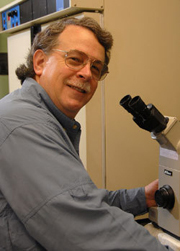
Malcolm J. Fraser Jr., a University of Notre Dame professor of biological sciences, has been selected as a fellow of the Entomological Society of America (ESA). His selection as a fellow acknowledges outstanding contributions in one or more of the following: research, teaching, extension or administration.
Fraser joined the Notre Dame faculty in 1983. His research focuses on insect virology and invertebrate transgenesis and includes work with baculoviruses and Dengue fever virus.
Among his contributions is the development of an agarose-based plaque essay for baculoviruses that permitted the characterization of a unique group of baculovirus mutants associated with acquisition of host transposons. One of these tranposons, named piggyBac_, has been developed over the years into a functional gene vector for protist (_Plasmodium falciparum), invertebrate and vertebrate transgenesis. While working in the lab of Max D. Summers at Texas A&M University, he participated in the development of the baculovirus expression of the vector system.
While at Notre Dame, Fraser established the currently accepted model for baculovirus assembly, elaborated the genetics of transposon mutagenesis of baculoviruses, and developed the piggyBac transposon vector system. More recently, he has pursued novel ribozyme approaches to suppression of Dengue fever virus in transgenic mosquitoes as part of a Bill and Melinda Gates Foundation Grand Challenge in Global Health award.
Fraser is a member of the recently endowed Eck Institute for Global Heath at Notre Dame and his current research projects include development of transgenic refractoriness for Dengue virus in Aedes as a possible means for intervention and prevention, developing improvements in transgenesis of mosquito vectors for both genetic manipulation and functional genomics analyses, and exploitation of transgenic Bombyx mori as protein bioreactors.
Fraser has mentored 11 postdoctoral associates, 12 doctoral students and more than 40 undergraduate research students. He is the co-author of seven patents and the author of more than 65 publications. His past honors include being the recipient of an NIH Research Career Development Award and a fellow of the American Association for the Advancement of Sciences (AAAS) and the Royal Entomological Society of London.
He has served as secretary and chairman of the Invertebrate Division of the Tissue Culture Association and as a panel member for the entomology and nematology study sections of both USDA-ARS and NIH/NIAID. His memberships include the American Chemical Society, American Society for Virology, American Society for Microbiology, AAAS, American Society of Tropical Medicine and Hygiene, and the Genetics Society of America.
Fraser earned his bachelor’s degree at Wheeling College and his master’s and doctoral degrees in entomology with an emphasis in invertebrate pathology at Ohio State University. He did postdoctoral research at Penn State University and Texas A&M.
Founded in 1989, ESA is a nonprofit organization committed to serving the scientific and professional needs of nearly 6,000 entomologists and individuals in related disciplines. ESA’s membership includes representatives from educational institutions, government, health agencies and private industry.
Fraser and the other 2009 ESA fellows will be recognized during the ESA annual meeting, to be held Dec. 13 to 16 in Indianapolis.